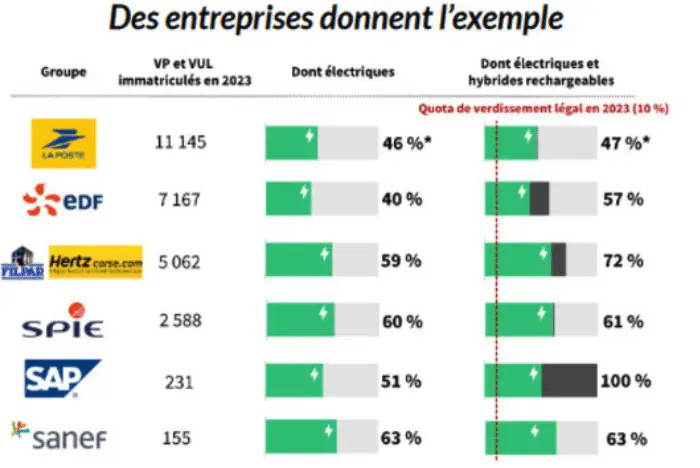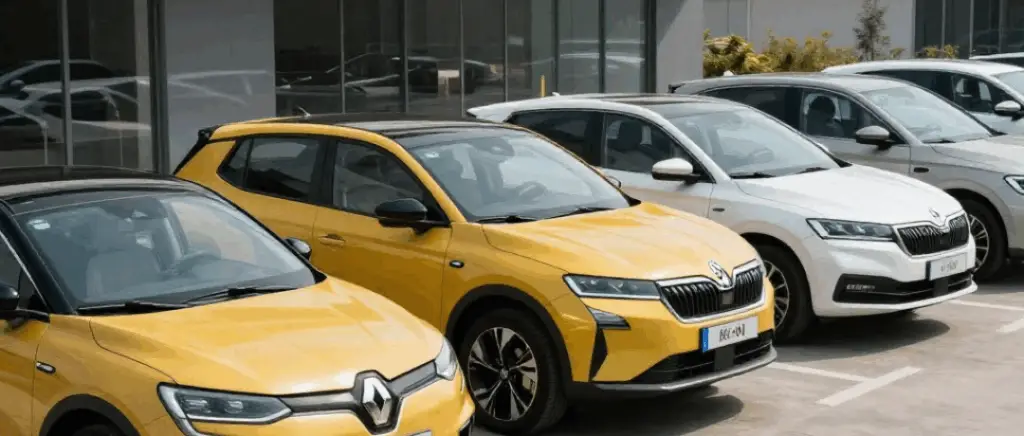Monday to Friday
9am - 12.30pm - 2pm - 7pm
What are the legal requirements for companies to make the transition to electricity?
Current legislative framework: deciphering obligations
Under French legislation, companies are subject to strict obligations to accelerate the ecological transition of their vehicle fleets. The LOM Actreinforced by the Climate and Resilience ActThe European Commission's Green Paper on Climate Change imposes a demanding legislative framework, with clear targets for companies with more than 50 employees. The aim of this legislation is to facilitate the deployment of new mobility solutions and to initiate a transition towards cleaner means of transport, in particular through the electrification of vehicle fleets.
In accordance with the LOM law, companies with a fleet of more than 100 vehicles are required to meet a timetable for renewing their fleets, including a minimum proportion of low-emission vehicles. The targets set call for the introduction of 10 % of low-emission vehicles from January 2022, 20 % from January 2024, 35 % for January 2027and finally 50 % for January 2030.
However, in view of the number of companies not complying with the regulations (more than 2,000 out of around 3,500 in France), a new bill has been proposed. This billto reinforce fleet electrification quotas and introduce penalties for non-compliance. The bill would also exclude plug-in hybrid vehicles from these quotas from next year, thus pushing companies towards more genuine electrification of their fleets.
Some companies, such as SNCF, Iliad-Free, Air Liquide and Carrefour, have posted Electric vehicle acquisition rates well below expectationsThe best performers, such as EDF, La Poste and SPI, are well ahead of target, with a steady stream of electric vehicle registrations.

Source : T&E
Also read → Company charging points: what does the law say?
Planned changes and reinforcements: towards stricter regulations?
In response to the urgent need to tackle climate change, French regulations on the electrification of company car fleets are changing. The finance act introduces major adjustments to encourage businesses to speed up their transition to electromobility, in particular through a new environmental bonus and the introduction of a environmental score. However, companies can no longer claim the environmental bonus for the purchase of new cars, with the exception of a bonus of €3,000 for the purchase of electric commercial vehicles N1 category.
In addition, as mentioned above, a proposed law by MP Damien Adam is being considered to achieve the objectives of greening corporate fleets. Here are the key points of this proposal:
- Companies will have to include a growing proportion of very low emission vehicles in their fleets (20 % from 2024, 40 % in 2026, 65 % in 2028, and 95 % in 2030).
- Rechargeable hybrid vehicles will be excluded from the calculations in favour of all-electric and hydrogen vehicles.
- Companies failing to comply with the greening quotas could face fines of up to €10,000, or €20,000 in the event of a repeat offence.
- Companies will have to declare how far they have achieved their greening objectives, or face financial penalties.
- Vehicles converted to electric or hydrogen power will be considered as new models for the purposes of calculating quotas.
- Taxi and VTC fleets will be included in the new greening trajectories.
Benefits and support: why should companies go electric?
How can I benefit from electrification grants?
A range of financial and tax incentives are available to help companies electrify their businesses. vehicle fleet. Although the ecological bonus for the purchase of new electric cars has been abolished for companies, they can still benefit from a 3,000 bonus for the purchase of new electric vans.
La conversion premium has also been adjusted, and is now subject to an environmental score, the eco-score, which encourages the purchase of less polluting vehicles. The amounts of this bonus vary according to the type of vehicle, offering up to 8,000 euros for certain commercial vehicles, depending on their category.
In addition to direct purchase subsidies, there are significant tax benefits for companies that include electric vehicles in their fleets. Exemption fromex-TVS (annual tax on CO2 emissions and annual tax on emissions of atmospheric pollutants) for electric vehicles. This reduces the annual cost of using these vehicles. In addition, exemptions on registration tax (ex-carte grise) are available for electric and plug-in hybrid vehicles, representing significant savings.
We recommend that you carry out a audit of your vehicle fleet to identify your needs and assess the feasibility of your project. This audit includes an analysis of costs, savings and requirements in terms of recharging infrastructure.
What are the benefits of having an electric fleet?
The electrification of a company car fleet is part of an overall strategy that is beneficial on several levels.
Significant savings
Switching to an electric fleet offers companies non-negotiable savings. Firstly, the cost of energy to charge an electric vehicle is generally lower than the cost of fuel for an electric vehicle. thermal vehicleCharging an electric vehicle to cover 100 km generally costs between €2.25 and €3.41 in France, while the cost for a combustion vehicle is around €9 for the same distance. Electric vehicles also require less maintenance, as they have fewer moving parts and do not require oil changes, which reduces routine maintenance costs and extends the life of the vehicle. Exemption from certain taxes and subsidies on purchase further increase these savings.
Enhancing brand image
A commitment to electromobility enhances a company's brand image, positioning it as a responsible, forward-thinking player in the field of sustainability. This is well illustrated by the companies mentioned at the start of this article. Consumers are increasingly aware of environmental issues and value companies that take concrete steps to reduce their carbon footprint. carbon footprint. Having an electric fleet can therefore improve the perception of the brand among customers, partners and employees, encouraging loyalty and attracting new talent who are sensitive to these issues.
Optimised performance
Electric vehicles offer a superior driving experience, with instant acceleration and quieter operation, improving comfort for drivers. What's more, the environmental performance of electric vehicles is undeniable, with zero CO2 emissions in use, contributing directly to the company's greenhouse gas reduction targets. This improvement in performance is not limited to environmental aspects, but also extends to logistics and operational efficiency, as electric vehicles can be recharged on site, reducing the time and costs associated with refuelling.
Also read → The advantages of electric cars for SMEs
Is the future of the car fleet electric?
Reducing CO2 emissions: a crucial issue for businesses
In 2024, reducing CO2 emissions is a crucial issue. Businesses are at the heart of a transition, driven by technological advances and ecological imperatives, with a major focus on reducing their carbon footprint as part of the National Low-Carbon Strategy (SNBC). This strategy aims to achieve carbon neutrality by 2050.
Companies are being encouraged to adopt electric and plug-in hybrid vehicles in their fleets, an important step given the rise in the number of electric and plug-in hybrid vehicles. low-emission zones (ZFE) and the need to reduce emissions in conurbations with more than 150,000 inhabitants. The benefits of electric cars include not only a reduction in air pollution, but also better energy management thanks to the potential of Vehicle-to-Grid (V2G) technologies, which allow energy to be fed back into the grid during peaks in demand.
The national commitment to reducing CO2 emissions has resulted in clear objectives: to reduce emissions from 441 million tonnes in 2019 to 315 million tonnes in 2030, with a strategy based on responsible growth and effective anti-emissions measures (decarbonisation of industry, promotion of clean vehicles). This path towards a low-carbon economy also includes mandatory carbon reporting for large companies, encouraging them to measure and publish the emissions linked to their activities.
What are the consequences for recalcitrant companies?
Tougher regulatory requirements
The European Union has taken steps to regulate business practices, particularly in the automotive sector, in order to speed up the transition to a green and sustainable economy.
The proposal for a Directive of the European Parliament and of the Council on the duty of care of companies with regard to sustainability and its amendment in 2022 (Directive 2019/1937) highlights the importance of corporate behaviour in all economic sectors. Companies must integrate sustainability into their governance and management systems and make business decisions taking into account impacts on human rights, the climate and the environment, as well as the company's long-term resilience. This directive highlights the need for companies, particularly those in the automotive sector, to identify risks relating to respect for human rights and environmental impacts.
Implementation through sanctions
EU companies that fail to comply with these enhanced regulatory requirements face sanctions. Although the precise details of the penalties are adjusted according to the context and the seriousness of the non-compliance, the regulatory framework is moving towards fines and mandatory measures. The aim is twofold: to encourage the implementation of sustainable practices and to punish non-compliance effectively.
Impact on recalcitrant companies
Companies risk significant fines that could have a direct impact on their profitability. In addition, the impact on their reputation could damage their relations with consumers, investors and business partners, as transparency and duty of care have become essential criteria for these stakeholders.
The automotive sector is a particularly good example of the complexity of these challenges, with, for example, around 450,000 electronic and software requirements for a well-equipped mid-range vehicle, plus a further 50,000 mechanical and regulatory requirements. This complexity accentuates the need for automotive companies to meet sustainability and environmental impact standards, or risk penalties for non-compliance with current regulations.
Also read → Compulsory electricity points: electrify your business
Conclusion
The move towards tougher requirements and penalties for recalcitrant companies therefore underlines the imperative of compliance in the context of the transition to a greener, more sustainable economy. Automotive companies, in particular, must navigate a complex and evolving regulatory environment, integrating sustainability into all levels of their operations to avoid potentially serious financial and reputational consequences.
For more information, we've put together a guide to this topic to explore the different aspects in depth:
Read our article about :




































